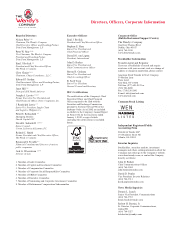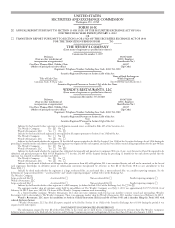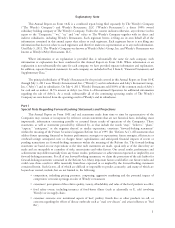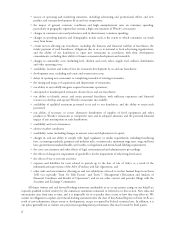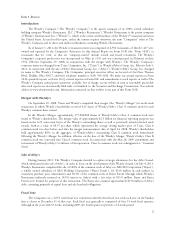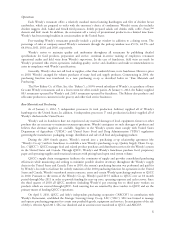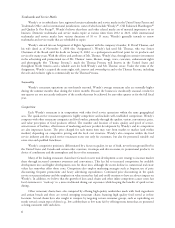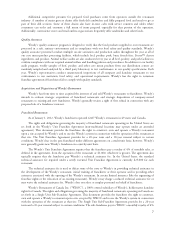Wendy's 2011 Annual Report Download - page 9
Download and view the complete annual report
Please find page 9 of the 2011 Wendy's annual report below. You can navigate through the pages in the report by either clicking on the pages listed below, or by using the keyword search tool below to find specific information within the annual report.Operations
Each Wendy’s restaurant offers a relatively standard menu featuring hamburgers and filet of chicken breast
sandwiches, which are prepared to order with the customer’s choice of condiments. Wendy’s menu also includes
chicken nuggets, chili, baked and french fried potatoes, freshly prepared salads, soft drinks, milk, coffee, Frosty™
desserts and kids’ meals. In addition, the restaurants sell a variety of promotional products on a limited time basis.
Wendy’s has been testing breakfast in certain markets in the United States.
Free-standing Wendy’s restaurants generally include a pick-up window in addition to a dining room. The
percentage of sales at company-owned Wendy’s restaurants through the pick-up window was 65.1%, 64.9%, and
64.6% in 2011, 2010, and 2009, respectively.
Wendy’s strives to maintain quality and uniformity throughout all restaurants by publishing detailed
specifications for food products, preparation and service, continual in-service training of employees, restaurant
operational audits and field visits from Wendy’s supervisors. In the case of franchisees, field visits are made by
Wendy’s personnel who review operations, including quality, service and cleanliness and make recommendations to
assist in compliance with Wendy’s specifications.
Generally, Wendy’s does not sell food or supplies, other than sandwich buns, to its franchisees. However, prior
to 2010, Wendy’s arranged for volume purchases of many food and supply products. Commencing in 2010, the
purchasing function was transferred to a new purchasing co-op as described below in “Raw Materials and
Purchasing.”
The New Bakery Co. of Ohio, Inc. (the “Bakery”), a 100% owned subsidiary of Wendy’s, is a producer of buns
for some Wendy’s restaurants, and to a lesser extent for other outside parties. At January 1, 2012, the Bakery supplied
803 restaurants operated by Wendy’s and 2,603 restaurants operated by franchisees. The Bakery also produces and
sells some products to customers in the grocery and other food service businesses.
Raw Materials and Purchasing
As of January 1, 2012, 5 independent processors (6 total production facilities) supplied all of Wendy’s
hamburger in the United States. In addition, 6 independent processors (7 total production facilities) supplied all of
Wendy’s chicken in the United States.
Wendy’s and its franchisees have not experienced any material shortages of food, equipment, fixtures or other
products that are necessary to maintain restaurant operations. Wendy’s anticipates no such shortages of products and
believes that alternate suppliers are available. Suppliers to the Wendy’s system must comply with United States
Department of Agriculture (“USDA”) and United States Food and Drug Administration (“FDA”) regulations
governing the manufacture, packaging, storage, distribution and sale of all food and packaging products.
During the 2009 fourth quarter, Wendy’s entered into a purchasing co-op relationship agreement (the
“Wendy’s Co-op”) with its franchisees to establish a new Wendy’s purchasing co-op, Quality Supply Chain Co-op,
Inc. (“QSCC”). QSCC manages food and related product purchases and distribution services for the Wendy’s system
in the United States and Canada. Through QSCC, Wendy’s and Wendy’s franchisees purchase food, proprietary
paper and operating supplies under national contracts with pricing based upon total system volume.
QSCC’s supply chain management facilitates the continuity of supply and provides consolidated purchasing
efficiencies while monitoring and seeking to minimize possible obsolete inventory throughout the Wendy’s supply
chain in the United States and Canada. Prior to 2010, the system’s purchasing function was performed and paid for
by Wendy’s. In order to facilitate the orderly transition of the 2010 purchasing function for operations in the United
States and Canada, Wendy’s transferred certain contracts, assets and certain Wendy’s purchasing employees to QSCC
in 2010. Pursuant to the terms of the Wendy’s Co-op, Wendy’s paid $15.5 million to QSCC over an 18 month
period through May 2011 in order to provide funding for start-up costs, operating expenses and cash reserves. Since
the third quarter of 2010 all QSCC members (including Wendy’s) pay sourcing fees to third party vendors on
products which are sourced through QSCC. Such sourcing fees are remitted by these vendors to QSCC and are the
primary means of funding QSCC’s operations.
On April 5, 2010, QSCC and Arby’s independent purchasing cooperative (“ARCOP”) in consultation with
Wendy’s Restaurants, established the Strategic Sourcing Group Co-op, LLC (“SSG”). SSG was formed to manage
and operate purchasing programs for certain non-perishable goods, equipment and services. In anticipation of the sale
of Arby’s, effective April 2011, SSG was dissolved and its activities were transferred to QSCC and ARCOP.
5


